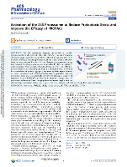| dc.contributor.author | Sedláček, Jindřich | |
| dc.date.accessioned | 2025-04-18T18:10:52Z | |
| dc.date.available | 2025-04-18T18:10:52Z | |
| dc.date.issued | 2024 | |
| dc.identifier.uri | https://hdl.handle.net/20.500.14178/3081 | |
| dc.description.abstract | The 26S proteasome degrades the majority of cellular proteins and affects all aspects of cellular life. Therefore, the 26S proteasome abundance, proper assembly, and activity in different life contexts need to be precisely controlled. Impaired proteasome activity is considered a causative factor in several serious disorders. Recent advances in proteasome biology have revealed that the proteasome can be activated by different factors or small molecules. Thus, activated ubiquitin-dependent proteasome degradation has effects such as extending the lifespan in different models, preventing the accumulation of protein aggregates, and reducing their negative impact on cells. Increased 26S proteasome-mediated degradation reduces proteotoxic stress and can potentially improve the efficacy of engineered degraders, such as PROTACs, particularly in situations characterized by proteasome malfunction. Here, emerging ideas and recent insights into the pharmacological activation of the proteasome at the transcriptional and posttranslational levels are summarized. | en |
| dc.language.iso | en | |
| dc.relation.url | https://doi.org/10.1021/acsptsci.4c00408 | |
| dc.rights | Creative Commons Uveďte původ 4.0 International | cs |
| dc.rights | Creative Commons Attribution 4.0 International | en |
| dc.title | Activation of the 26S Proteasome to Reduce Proteotoxic Stress and Improve the Efficacy of PROTACs | en |
| dcterms.accessRights | openAccess | |
| dcterms.license | https://creativecommons.org/licenses/by/4.0/legalcode | |
| dc.date.updated | 2025-04-28T13:41:07Z | |
| dc.subject.keyword | proteasome | en |
| dc.subject.keyword | PROTAC | en |
| dc.subject.keyword | cAMP | en |
| dc.subject.keyword | cGMP | en |
| dc.subject.keyword | p38 MAPK | en |
| dc.subject.keyword | NFE2L1 | en |
| dc.subject.keyword | NFE2L2 | en |
| dc.subject.keyword | USP14 | en |
| dc.identifier.eissn | 2575-9108 | |
| dc.relation.fundingReference | info:eu-repo/grantAgreement/MSM//LX22NPO5103 | |
| dc.relation.fundingReference | info:eu-repo/grantAgreement/MSM//SVV260679 | |
| dc.relation.fundingReference | info:eu-repo/grantAgreement/GA0/GA/GA22-16389S | |
| dc.relation.fundingReference | info:eu-repo/grantAgreement/UK/COOP/COOP | |
| dc.date.embargoStartDate | 2025-04-28 | |
| dc.type.obd | 73 | |
| dc.type.version | info:eu-repo/semantics/publishedVersion | |
| dc.identifier.doi | 10.1021/acsptsci.4c00408 | |
| dc.identifier.utWos | 001378668600001 | |
| dc.identifier.eidScopus | 2-s2.0-85212547038 | |
| dc.identifier.obd | 656562 | |
| dc.identifier.pubmed | 39816802 | |
| dc.subject.rivPrimary | 10000::10600 | |
| dcterms.isPartOf.name | ACS Pharmacology & Translational Science | |
| dcterms.isPartOf.issn | 2575-9108 | |
| dcterms.isPartOf.journalYear | 2024 | |
| dcterms.isPartOf.journalVolume | 8 | |
| dcterms.isPartOf.journalIssue | 1 | |
| uk.faculty.primaryId | 115 | |
| uk.faculty.primaryName | Přírodovědecká fakulta | cs |
| uk.faculty.primaryName | Faculty of Science | en |
| uk.department.primaryId | 1034 | |
| uk.department.primaryName | Katedra genetiky a mikrobiologie | cs |
| uk.department.primaryName | Department of Genetics and Microbiology | en |
| dc.description.pageRange | 21-35 | |
| dc.type.obdHierarchyCs | ČLÁNEK V ČASOPISU::článek v časopisu::přehledový článek | cs |
| dc.type.obdHierarchyEn | JOURNAL ARTICLE::journal article::summarizing article | en |
| dc.type.obdHierarchyCode | 73::152::205 | en |
| uk.displayTitle | Activation of the 26S Proteasome to Reduce Proteotoxic Stress and Improve the Efficacy of PROTACs | en |

